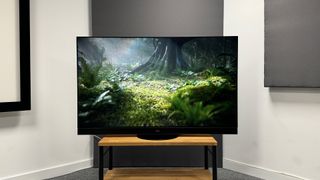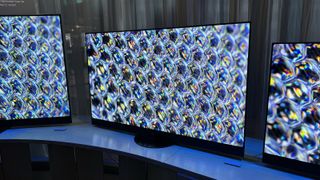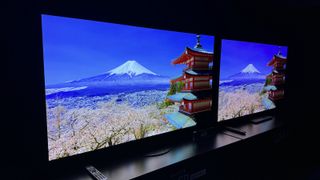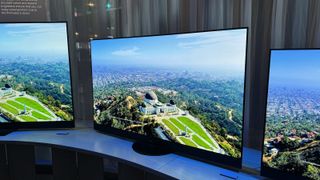In the world of premium TVs, OLED panels bolstered by MLA (Micro Lens Array) technology are hot stuff right now. Introduced last year and very much a part of LG and Panasonic's TV lineups for 2024, they bump up 'standard' OLED brightness to impressive newfound levels. But if you're going to spend thousands on a new TV this year, which MLA OLED should you go for?
The five-star Panasonic MZ2000 from last year remains an excellent choice, but the Panasonic Z95A – its successor, newly announced at CES – looked seriously impressive in the demonstrations we saw. (See for yourself by reading our hands-on Panasonic Z95A review.)
So what key differences are between the two Panasonic models, and which looks likely to be the better-value buy for 2024? Let's dive into the details to find out...
Panasonic Z95A vs MZ2000: price

The MZ2000 offered 55-, 65- and 77-inch sizes, while the new Z95A limits that to 55-inch and 65-inch versions. You can, however, still get a Z95A 77-inch 'variant' – but it's called the Z93A and, importantly, doesn't feature MLA technology. Neither does the 77-inch MZ2000, by the way.
We don't have official pricing on the Panasonic Z95A just yet, but we wouldn't expect initial pricing to differ much from the launch price of the MZ2000. Panasonic's 65-inch MZ2000 launched last year at £3599 / $4400, putting its pricing firmly in line with same-size rivals from 2023 such as the LG G3 or Samsung S95C. Today, you can get one for around £2999 / $3670, while competitors tend to go for even less.
In all likelihood, the Z95A will be similarly priced to the LG G4 and Samsung S95D, making it one of the pricier TVs to arrive in 2024 (not counting the crazily high-end ones that roll, bend or are transparent, of course!)
Panasonic Z95A vs MZ2000: design

In our MZ2000 review, we said of the TV's design: "Panasonic has long pursued a function-over-form design philosophy, and while that may have prevented its TVs from appearing in the backgrounds of reality TV shows, it’s an approach with which we have no real issue."
In general, the Z95A matches up quite well. Both offer thin black bezels, a full speaker system comprising a soundbar mounted under the screen, both side-firing and up-firing speakers on the back, and swivelling stands. While neither of these TVs is likely to win a beauty contest next to their best-looking rivals from the likes of LG and Samsung, they certainly get the job done – and there's nothing wrong with that,
Panasonic Z95A vs MZ2000: features

In terms of specs, the MZ2000 features an MLA 4K OLED panel, a 120Hz refresh rate, modern gaming features like VRR, ALLM and Dolby Vision game mode, a suite of HDR support by way of HLG, HDR10, HDR10+, and Dolby Vision, and four HDMI 2.1 ports.
With the new Z95A, you're getting a second-gen MLA 4K OLED panel, a bump up to a 144Hz refresh rate alongside those other gaming features, and an HDR upgrade with support for 'Dolby Vision IQ with Precision Detail'.
The newer Dolby Vision spec on the Z95A comes courtesy of its HCX Pro AI Processor MK II, which also facilitates a '4K Remaster Engine' that reportedly uses AI and 'mathematical models' to 'elevate streaming picture clarity'. Specifics on this are currently forthcoming.
That second-gen MLA panel looks to be a key differentiator in that it should increase peak brightness over the MZ2000, although Panasonic hasn't released exact figures on this yet and nor has LG Display, which manufactures the panel. While we expect some sort of upgrade, we won't know the extent or significance of it until we get both TVs in our test rooms for a full head-to-head.
Other panel improvements on the Z95A include an upgraded heatsink that, according to Panasonic, allows its OLEDs to do more without having to worry about image retention.
It's also worth noting that the Z95A 'only' has two HDMI 2.1 ports – not three or four like many of its 2024 rivals. That said, both do at least handle ALLM and VRR up to 60Hz. This was also the case with last year's MZ2000, by the way.
Panasonic Z95A vs MZ2000: picture

In our MZ2000 review, we concluded that it was "an excellent TV in terms of picture quality", calling out its impressive brightness, tons of detail and overall authenticity. The MZ2000 is not only the best Panasonic TV you can currently buy but also one of the very best TVs around, full stop. So the Z95A has big boots to fill.
We're quietly confident it will fill them, mind you. In our brief time with the Z95A at CES 2024, we said the TV "looked stunning in its own right, with bright highlights popping against pitch-black backgrounds in stunning fashion".
We haven't seen the Z95A and MZ2000 side-by-side just yet, nor have we had the chance to see the Z95A's 4K Remaster Engine in action, but with a supposedly upgraded MLA OLED panel, as well as a smattering of other updates over last year's model, there is good reason to expect some level of picture quality improvement.
Hang tight for our full review as soon as we get a sample in our test rooms.
Panasonic Z95A vs MZ2000: sound

In terms of audio quality, the Technics-tuned Dolby Atmos system on the MZ2000 "sound[ed] very good by TV standards", to quote our review, and proved a step up over the model-down MZ1500 and rivals such as the LG G3 and Samsung S95C. Still, it wasn't "up there with the new best-in-class for TV sound".
We should largely expect more of the same from the Z95A as the hardware remains the same, though Panasonic could bring some sort of improvement through its audio tuning, which the company said was still ongoing.
While we did go through a short sound demo of the Z95A, it was unfortunately extremely limited and hard to draw any conclusions from inside the busy Las Vegas Convention Center.
Panasonic Z95A vs MZ2000: early verdict
Once again, without having rigorously reviewed the Z95A, it's hard to say how it truly stacks up to its MZ2000 predecessor. That being said, considering the supposedly improved panel of the Z95A and our first impressions from going hands-on with it, we would be surprised if the Z95A didn't outpace the MZ2000 for at least picture performance.
Which is the better buy for 2024 will naturally depend on just how wide the gap is between their performances and, of course, their prices. We hope to find that out very soon.
MORE:
Everything you need to know about CES 2024
As well as all the best TVs you can buy right now
And what you need to know about MLA technology

